The History Around Us
October 22, 2016 2:13 pm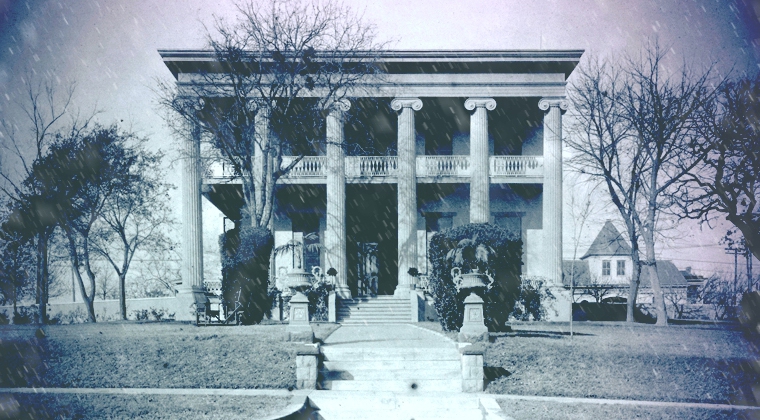
As I settled deeper and deeper into the healing relaxation of acupuncture, the air in the tiny therapy room chilled and the walls faded away. I was suddenly outside, standing in front of a house. It was a grand house, though not quite a mansion. It was only two stories high and the six columns on its front were much too large and disproportionate for the size of the house. It stood in the city, but there were no other houses close by.
Low gray clouds covered the sky. The air was cold and snow swirled in the wind. Further down the street, two women walked side by side, their dresses full and long and filled underneath with layers of petticoats. One dress was bright reds and yellows and whites and the other was a rich green. They had thick shawls pulled close around them. The style of their clothing looked to be from the 1890s.
Directly across the street from the house squatted two Black men dressed in work clothes. They talked between themselves as they patiently waited in the cold. They were not allowed to approach the house to do their work until their overseer came by to shuffle them in and watch over them as they worked. They would be arrested as criminals if they entered the house unsupervised.
I was seeing history come alive around me. This might have been alarming, except it had happened before during acupuncture sessions. The deep relaxation of the acupuncture was like meditation, opening a new level of awareness, seeing and feeling the history of a place, which endures after time moves on.
Since my acupuncturist is located in what was once the historic Black community of Kincheonville south of old Austin, I assumed that one or both of the Black men I saw had lived in Kincheonville and traveled up to Austin to work. I was seeing a bit of their own history that had been indelibly tied to the place where they once lived.
When I got home, I googled ‘1890s house in Austin Texas’. There it was. I had not recognized it. The Texas Governor’s Mansion is very different now, hidden behind high walls and fences and trees, with extensions and additions tacked onto it as it grew into a true mansion. The old photo that the search had found showed only a large square house with an oversized portico standing forlorn in its large yard. But it was unmistakably the same house that I saw.
It’s remarkable that these imprints of history persist, that they’re out there ready to be discovered. The acupuncture had brought the level of relaxation and awareness needed to see them. They’re unexplainable, but they are undeniable, especially when so vividly experienced.
Each Time I Cast My Ballot
October 12, 2016 5:19 pm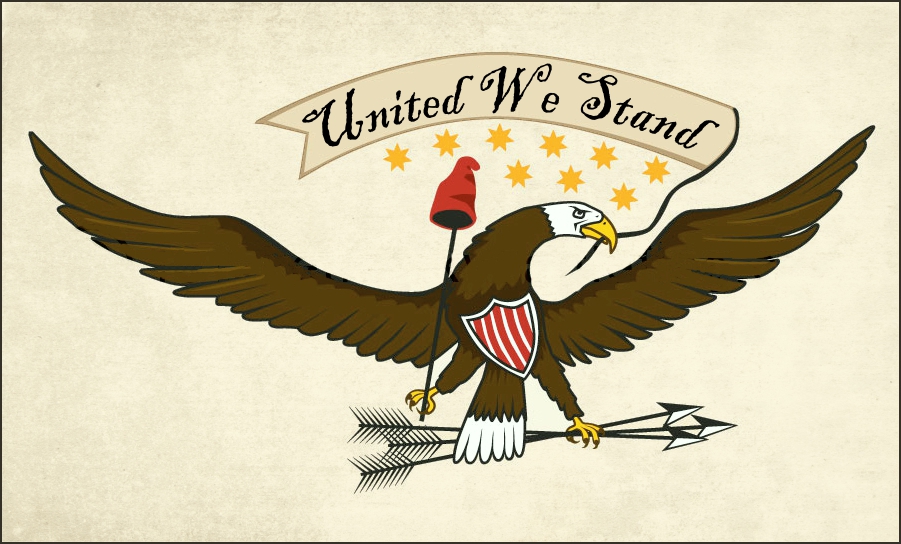
The War of 1812 is not as well known as the American Revolution. England didn’t want to give up its American colonies, so thirty years after she lost them, she tried to retake them. The English attacked from Canada, from the Atlantic, and finally from the Gulf of Mexico.
Fortunately, the United States had Kentuckians, thousands of sharpshooters who volunteered to fight the English in states far from their homes. Over 25,000 Kentuckians volunteered. It’s estimated that four out of every six men of fighting age in Kentucky fought in the War of 1812. Almost two-thirds of the casualties were Kentuckians.
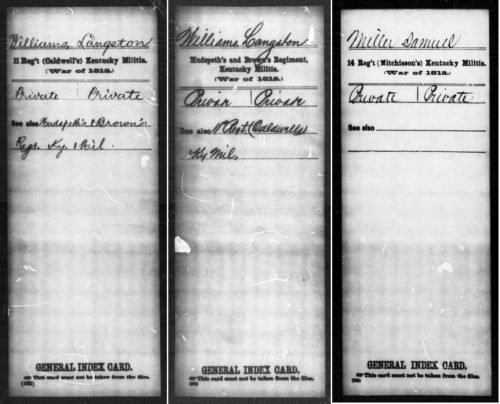 Two of those fighters were my great-great-great-grandfathers Langston Williams and Samuel Miller. They both lived in Allen County, Kentucky, and would have known each other, for Langston William’s grandson, William Briley Newton Williams, married Samuel Miller’s granddaughter, Fannie Miller, my great-grandparents.
Two of those fighters were my great-great-great-grandfathers Langston Williams and Samuel Miller. They both lived in Allen County, Kentucky, and would have known each other, for Langston William’s grandson, William Briley Newton Williams, married Samuel Miller’s granddaughter, Fannie Miller, my great-grandparents.
Samuel Miller served in Mitchusson’s Regiment of Kentucky Detached Militia at the Battle of New Orleans. Here is his entry in the Allen County Deed Book appointing his attorney to manage his service pay.
Dec. 28, 1816
I Samuel MILLER of Allen County formerly Warren County Kentucky … appoint John WALES of Allen County and state aforesaid my attorney … receive my pay from the United States for a tour of duty under the command of Captain Thomas GRIFFIN in the 14th Regiment of Kentucky detached militia … Signed: Samuel MILLER
Even making the fifteen hundred mile journey to New Orleans was an ordeal. When the men rendezvoused on the banks of the Ohio River to make the long float from there down the Mississippi River to New Orleans, the boats that had been promised were not there. The Quartermaster bought whatever dilapidated barges he could find and the troops used axes and frows to cut and shape lumber to patch them. They had also been promised suitable clothing, blankets, tents, arms and munitions, none of which were available. Many arrived only with the clothes they wore and nothing else. They only had a half supply of rations and few pots or kettles in which to cook.
Despite all these obstacles, the Kentucky volunteers arrived at their destination and played a crucial role in winning the Battle of New Orleans.
Langston Williams served in Hudspeth’s and Brown’s Regiment, Kentucky Militia, for two tours of duty. He probably fought in the Northwest frontier, helping to recover Detroit and other cities from the English. To reach the frontier, he and his fellow volunteers would have had to march from the southern border of Kentucky north to Ohio, then cross Ohio northwards into Michigan and what is now Ontario, Canada. That would have been a march of well over five hundred miles, much of it along primitive roads and hunting trails. They would have had to hunt to feed themselves as they traveled.
The hardships these patriots endured to protect our country shames anyone too lazy or indifferent to even vote. Voting is a small effort that helps to keep the United States a nation of the people. Each time I cast my ballot in an election, I do it to fulfill my duty and commitment to our country and to honor my ancestors and their sacrifices.
A Lasting Impression in Time
September 1, 2016 3:10 pm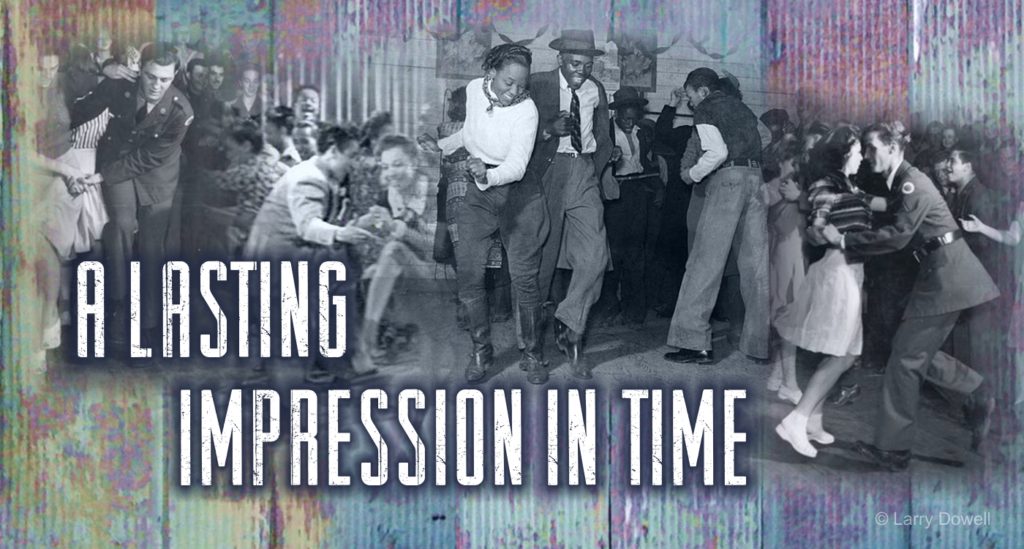
The lane was narrow and dusty. The fence alongside it was eight feet tall and made of corrugated tin roofing, painted long ago but now weathered and rusting. Layers of color showed through one another, cream and aqua green and pale blue. Weeds poked out from under the fence.
A WWII Jeep pulled up and parked. A sergeant jumped out, pulled open the tin gate and motioned the other soldiers to quickly get inside before they were seen. Soon after, a dark 1940s sedan pulled up and a man in a black suit and fedora got out and slipped through the gate. Next came a tall elegant Black woman in an evening dress in sumptuous shades of greens and blues and a dressy hat pinned in her hair, all straight out of the 1940s. She stood outside the gate a moment to gather herself and then pulled it open and stepped through.
Suddenly I was transported inside. It was a juke joint. The heat and the cigarette smoke were thick and music filled the room to bursting. A hundred people, packed shoulder to shoulder were moving to the beat. They moved as one, up, down, up, down, left and right. The band was crowded in the corner, the elegant woman’s rich voice giving the music a life of its own.
I could see and hear and smell and feel everything around me. I was there.
But I wasn’t; it was 70 years later and I was lying on a table with a row of acupuncture needles down either side of my spine and in my legs and arms, in a state of relaxation so complete that history had come alive around me.
After the session was over and all the needles were removed, I asked the acupuncturist if she knew anything about the history of that area on Brodie Lane. We had lived in the neighborhood many years and knew it had once been an historic Black community. That was all I knew.
She told me that the area was established by Thomas Kincheon in 1865 as a freed Black community. By the 1940s, it was home to many juke joints, famous for the jazz and swing bands that came to play there. During WWII, soldiers from Camp Mabry and other places would make the drive out into what was then the countryside outside Austin to frequent these juke joints.
I had only recently started using acupuncture; its therapeutic and healing properties quickly won me over. But being opened up to other realms of reality was surprising and unexpected. And that was not the only occasion; there have since been many others.
One time, there was an overwhelming smell of rain and wet dirt and wood. I was standing in the street as people emerged from their houses, looks of shock on their faces. The sky was black with clouds and there was a sliver of clear blue sky appearing on the horizon. The houses and buildings along the street were damaged and there were broken limbs and leaves everywhere. Buildings were still standing and roofs were torn but not missing, so there was probably a powerful storm but not a tornado. The people’s clothing and the cars seemed to be from the 1970s. Later I did some research and found record of a noteworthy Austin storm from that decade. On May 23, 1975, an intense storm with heavy rain, winds of 80 mph and large hail hit the city, injuring forty people, drowning four and causing $5 million in property damage.
Another time, there was a little boy playing under the table and looking up into my eyes as I lay face down. Then there were the half dozen Comanche calmly sitting on their horses, lined up by a dusty trail, waiting to meet someone. And there was the person with muscular dystrophy, their hand twisted out of shape, watching me to see what the acupuncture was all about.
The acupuncturist explained the heightened awareness was a result of the deep level of relaxation that came with the acupuncture. Although, she said, “Most people just see colors. You see spirits and history.”
I thought, “Great. I just want some healing relaxation. Alone.” But the curiosity is there now each time I go in. Who or what am I going to see next?
My Grandmother, the Feminist
August 26, 2016 9:01 amShe was already quite elderly when I was born, so I only knew my grandmother as the sweet, loving and encouraging Grandma with the houseful of books, magazines and newspapers and my favorite candy always in the candy dish. I never knew the independent young woman she had once been, going out to conquer the world. Recently, I have started piecing together who that young woman was from papers and memorabilia she treasured from that part of her life.
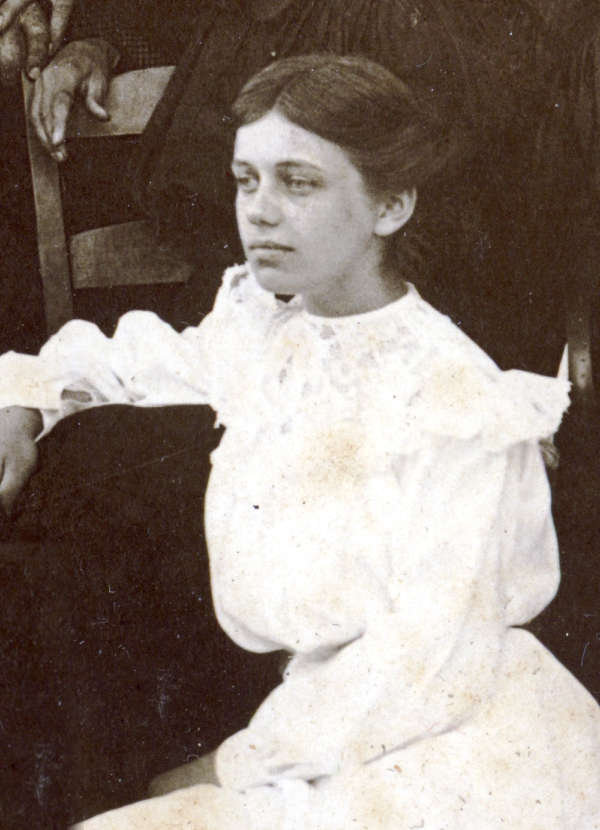 There is the postcard she saved from 1910, when she was a college student at Western Kentucky State Normal School, a teacher’s college in Bowling Green, Kentucky. It proclaims, “Paddling My Own Canoe.” I don’t know the significance of the big D on the canoe, but it looks prophetic now.
There is the postcard she saved from 1910, when she was a college student at Western Kentucky State Normal School, a teacher’s college in Bowling Green, Kentucky. It proclaims, “Paddling My Own Canoe.” I don’t know the significance of the big D on the canoe, but it looks prophetic now.
I have very little of the correspondence she wrote to others; most are letters and cards that were written to her. That correspondence probably tells as much about who she really was as her own writing might have. One very intriguing letter came in 1904 from a Mr. W. L. Sheppard, Sign Artist, in Gallatin TN, about 30 miles from where she lived in Scottsville KY. He wrote:
Kind Friend,
No doubt you will be somewhat surprised when you receive this letter from me, therefore I beg to explain. It was a mere accident that I came in possession of the egg bearing your name and address, and seeing that you were resident of “old Kentucky”, the state of my birth, and one that is indeed dear to me, as are also its people, especially the “girls”. The state which is justly noted for its fair women.
Therefore you will please pardon me for taking the liberty of writing to you, as it was a temptation that I could not resist. Wishing to satisfy my own curiosity and also for pastime I write you these few lines in an humble way, hoping that you may receive them in the same spirit in which they were penned. As to myself, I am 23 years old and unmarried (that’s not my fault) am tall have dark hair and hazel eyes. Awaiting a reply with much interest and anticipation. I am
Yours truly,
W. L. Sheppard
I don’t have my grandmother’s letter to Mr. Sheppard, but his reply to her is very enlightening, gentlemanly and tactful.
Dear Friend,
Your most kind and affectionate letter was received a few days ago and was read with much pleasure. I was, to say in the least, very much surprised, but nevertheless agreeably so, for one would judge by your handwriting that you were considerably older than thirteen years. You did no doubt thoughtlessly write your name on the egg, but I am exceedingly glad that I came in possession of it. By the way, I also see that you are somewhat of an artist by the drawing on the egg. I am a great lover of art and like yourself, am very fond of flowers also.
Many thanks for the high compliment that you pay my writing, and in return allow me to say that you are the one who deserves it. It seems to me that I am the one who should take lessons in writing from you. Your penmanship is simply magnificent and would be a credit to several older persons with whom I am acquainted.
You say that you are a romping, fun-loving country girl. What a blessing, especially to one who loves flowers. How happy and contented you must be. No, I am not in the least disappointed, and shall ever remember you and shall always cherish the memory of you, a little Kentucky friend. Goodbye for this time and may the Lord bless you.
Your friend,
W. L. Sheppard
There is also the newspaper clipping she saved, The Reason Men Do Not Like Clever Girls. She was a clever girl; in 1910 she sent an inquiry to the American Book Company for the prices of Morey’s Ancient History, Morey’s Roman History and Morey’s Greek History. I don’t know if she ordered any of these, but I do have her copies of Milton’s Poems, Washington Irving’s Sketchbook, Tennyson’s The Coming of Arthur, and, most proudly, her copy of Manual of the Constitution of the United States, published by the American Book Company, over 400 pages and well used.
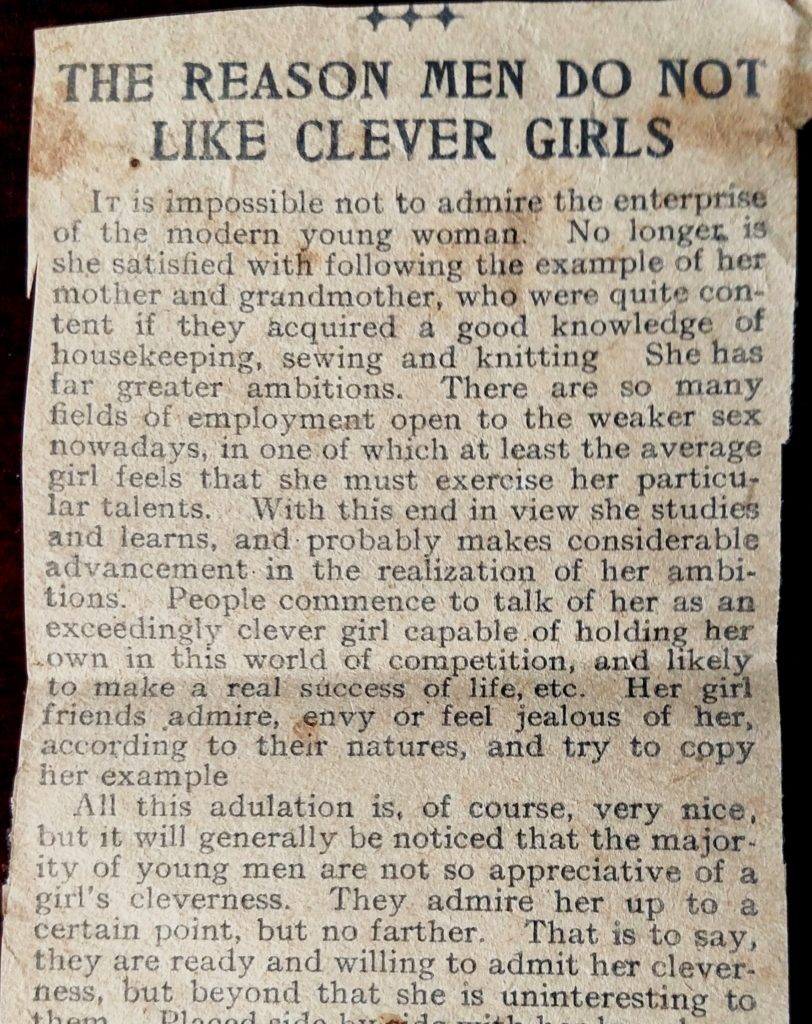 There are no papers or documents proclaiming that she was a Feminist. Still, she was a bright and independent young woman and she went off to college, not to learn household skills, which would have been the norm for the time, but to gain a higher education and to become a teacher. And she studied the Constitution, so she would have been very aware of the fight for women’s suffrage that was reinvigorated in 1910/11 in California and Washington.
There are no papers or documents proclaiming that she was a Feminist. Still, she was a bright and independent young woman and she went off to college, not to learn household skills, which would have been the norm for the time, but to gain a higher education and to become a teacher. And she studied the Constitution, so she would have been very aware of the fight for women’s suffrage that was reinvigorated in 1910/11 in California and Washington.
For a young woman growing up in rural Kentucky in the early 1900’s, all this is even more remarkable. I know her parents were bright and loving people, for I have some of their correspondence as well, and they would have been proud of her independence.
I always felt a special bond with my grandmother. I still feel her near, even though she’s been gone for many, many years. As I learn more about her, I am proud to call her my Grandmother, the Feminist.
We Must All Stand Together
July 7, 2016 9:03 pm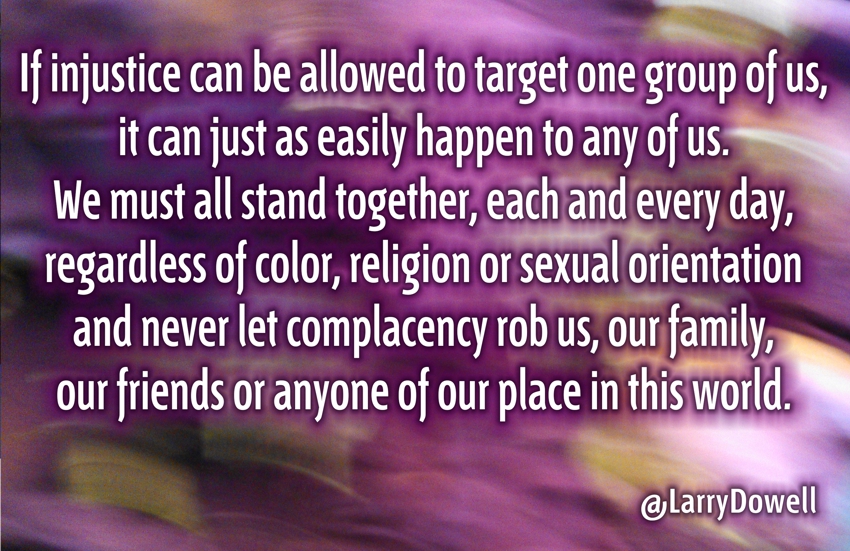
Malachi Francis
July 4, 2016 12:19 pm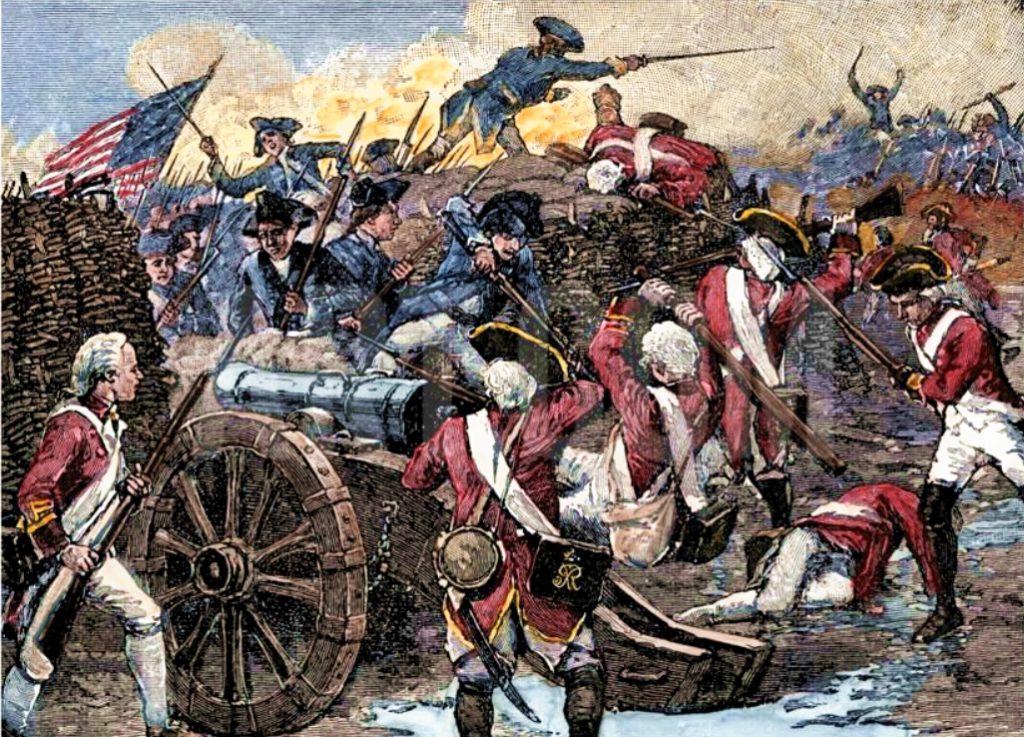
On this 4th of July, I’m honoring the service of our Revolutionary War ancestors, including my great-great-great-great-grandfather Malachi Francis. He was born April 21, 1764, in Halifax Co., VA, and enlisted as a private on April 1, 1777, just before he turned 13. He joined the 4th Virginia Regiment of Foot, commanded by Colonel Thomas Elliott. He & his regiment soon marched to Pennsylvania and fought in the Battle of Brandywine, Sept 11, 1777. Among other battles, he was at the Battle of Guilford Courthouse, NC, on March 15, 1781, and at the siege of Yorktown, VA, in Sept-Oct 1781. He was at Cornwallis’ surrender on Oct. 19, 1781. Malachi Francis rose to the rank of Lieutenant before he was 18. He died in Barren Co., KY on June 12, 1831.
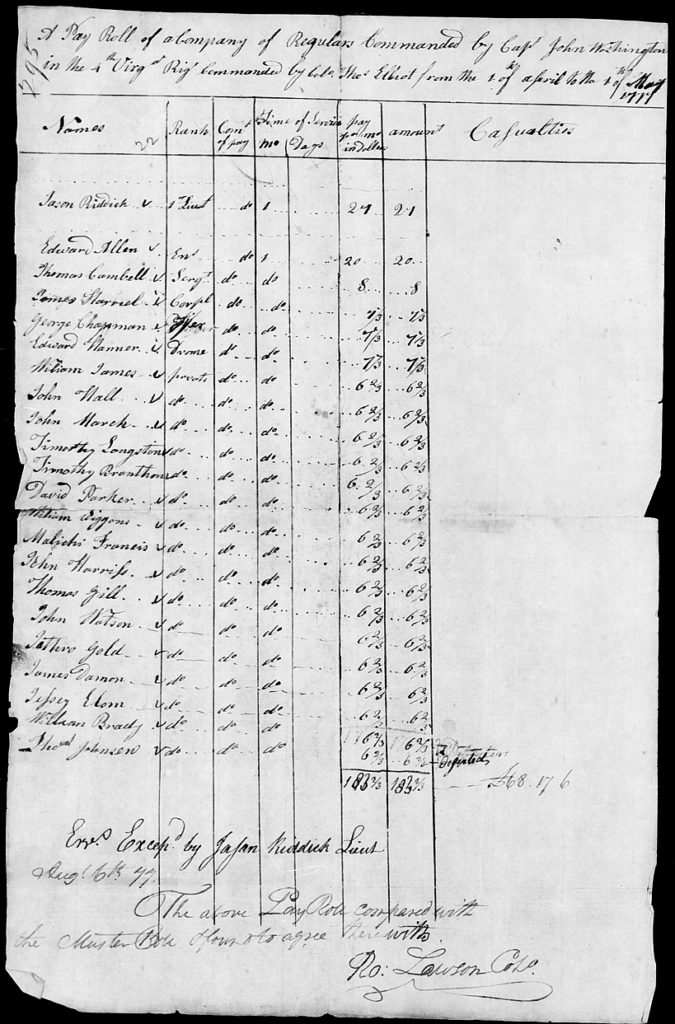
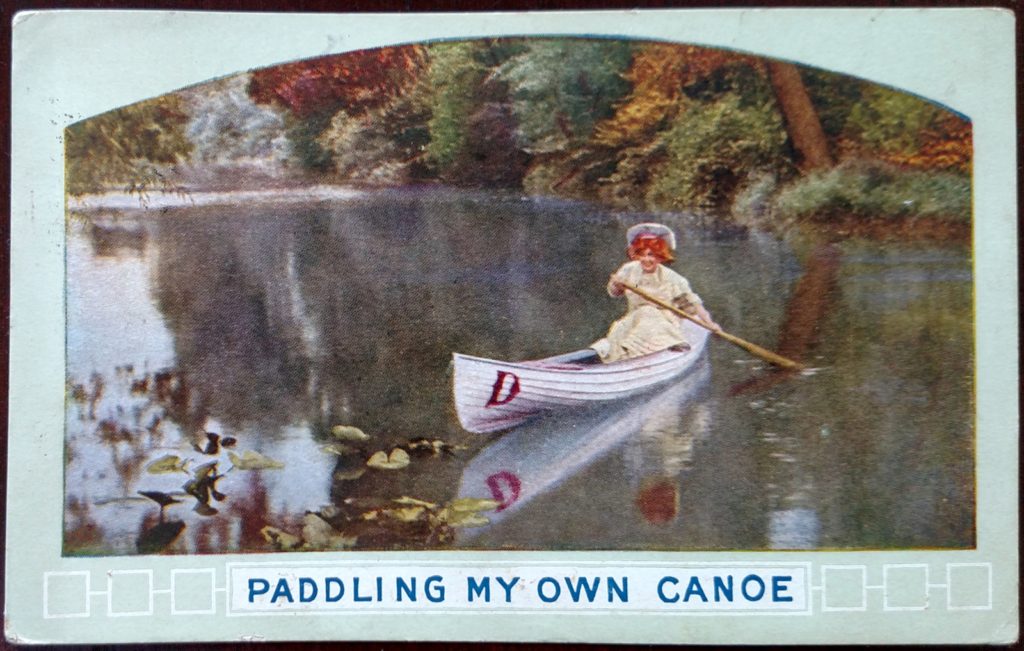
You must log in to post a comment.